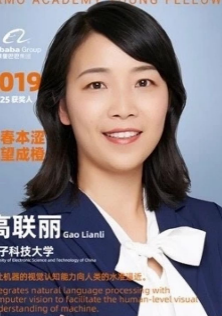
姓 名:高联丽
性 别: 女
出生年份:1987年
职 称: 副教授、硕士生导师
学 位: 博士
电子邮件:lianli.gao@uestc.edu.cn
个人简介
高联丽副教授于2014年加入电子科技大学。目前主要从事多媒体(图像和视频等)和机器学习方面的研究工作。荣幸获阿里巴巴达摩院第二届青橙奖、2019年度四川省三八红旗手称号等荣誉。其较为突出的学术贡献之一为:在为计算机视觉领域的国际顶级会议IEEI Conference on Computer Vision and Pattern(CVPR2015)上发表一篇CCFA论文,该论文提出了一种最优图学习算法,并成功应用到了图形和视频标注上。
学术经历
2010/03-2014/01 澳大利亚昆士兰大学,电子技术与电气工程学院,博士;2005/09-2009/06 电子科技大学,计算机科学与工程学院,本科
科研项目
1、基于深度学习和事件驱动的视频聚合研究(2015年国家青年基金项目)
发表论文
(一)外文期刊
[1]Play and rewind: Context-aware video temporal action proposals, Pattern Recognition,2020,107.
[2]Unsupervised urban scene segmentation via domain adaptation, Neurocomputing,2020,406.
[3]Fused GRU with semantic-temporal attention for video captioning, Neurocomputing,2020,395.
[4]Question-Led object attention for visual question answering, Neurocomputing,2020,391.
[5]A framework for image dark data assessment, World Wide Web,2020(prepublish).
[6]Unified Binary Generative Adversarial Network for Image Retrieval and Compression, International Journal of Computer Vision,2020(prepublish).
[7]Understanding and improving ontology reasoning efficiency through learning and ranking, Information Systems,2020,87.
[8]Fusion by synthesizing: A multi-view deep neural network for zero-shot recognition, Signal Processing,2019,164.
[9]Synchronization-based clustering on evolving data stream, Information Sciences,2019,501.
[10] Low-rank network signatures in the triple network separate schizophrenia and major depressive disorder, NeuroImage: Clinical,2019,22.
[11]Deep adversarial metric learning for cross-modal retrieval, Springer US,2019,22(2).
[12]Residual attention-based LSTM for video captioning, Springer US,2019,22(2).
[13]Exploiting long-term temporal dynamics for video captioning, Springer US,2019,22(2).
[14]Traffic sign detection and recognition based on pyramidal convolutional networks, Neural Computing and Applications,2019(prepublish).
[15] Multiple hierarchical deep hashing for large scale image retrieval, Multimedia Tools and Applications,2018,77(9).
[16]JQuantization-based hashing: a general framework for scalable image and video retrieval, Pattern Recognition,2018,75.
[17]Deep appearance and motion learning for egocentric activity recognition, Neurocomputing,2018,275.
[18]Learning in high-dimensional multimedia data: the state of the art, Multimedia Systems,2017,23(3).
[19]Deep and fast: Deep learning hashing with semi-supervised graph construction, Image and Vision Computing,2016,55.
[20]Exploiting score distribution for heterogenous feature fusion in image classification, Neurocomputing,2016.
[21]Spatial and temporal scoring for egocentric video summarization, Neurocomputing,2016,208.
[22]Large-scale image retrieval with supervised sparse hashing, Neurocomputing,2016.
[23]Self-representation nearest neighbor search for classification, Neurocomputing,2016,195.
[24]Real-time social media retrieval with spatial, temporal and social constraints, Neurocomputing,2016.
[25]Kernel based Latent Semantic Sparse Hashing for Large-scale Retrieval from Heterogeneous Data Sources, Neurocomputing,2016.
[26]Feature aggregating hashing for image copy detection, World Wide Web,2016,19(2).
[27]Corrigendum to “A web-based semantic tagging and activity recognition system for species' accelerometry data” [Ecol. Inf. 13 (2013) 47–56], Ecological Informatics,2014,22.
[28]A Web-based semantic tagging and activity recognition system for species' accelerometry data, Ecological Informatics,2013,13.
[29]Digital technologies and English instruction in China’s higher education system, Teacher Development,2012,16(2).